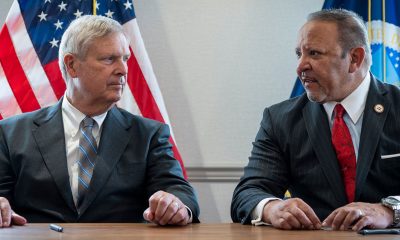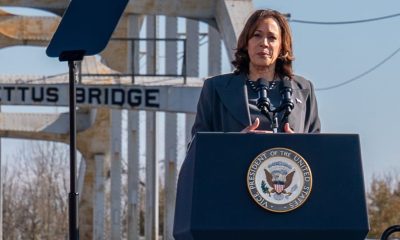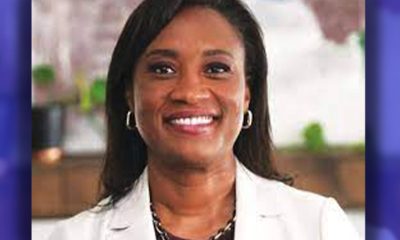Politics
Life Sentence: Florida’s Refusal for Ex-Felon Voting Rights
Florida refuses to restore full constitutional rights to ex-felons. The result? One Black Floridian of every four can’t vote, hold office or serve on a jury.
Special to the NNPA from the Florida Courier
Commit any felony in Florida and you lose your right to vote for life – unless the governor and the clemency board agree to give that right back to you.
 The result: More than 1.6 million Floridians – about 9 percent – cannot vote, hold office or serve on a jury, according to The Sentencing Project, a prison reform group. In most states, it’s less than two percent. Only two other states have that tough a policy.
The result: More than 1.6 million Floridians – about 9 percent – cannot vote, hold office or serve on a jury, according to The Sentencing Project, a prison reform group. In most states, it’s less than two percent. Only two other states have that tough a policy.
Twenty-five percent of Florida’s Black population – that’s 1 in 4 – can’t vote, even though just 17 percent of the state’s population is Black.
Tougher under Scott
Laws nationwide on whether convicted felons can vote vary widely.
In Vermont and Maine, the currently incarcerated can vote by absentee ballot, while Florida, Kentucky and Iowa are at the harshest end of the spectrum, mandating that all ex-felons lose their civil rights until they petition to have them back. In other states, ex-felons generally get their rights back when they get out of prison or off probation.
In Florida, getting back those rights has become far tougher in the past four years. Under Gov. Rick Scott, 1,534 nonviolent felons had their rights restored. More than 11,000 others applied but are still waiting for an answer.
Only the governor and the three-member Cabinet, who act as the clemency board and meet four times a year, can restore civil rights.
The application process requires a five-year wait for less-serious felonies and seven years for others, along with an application form and, for each felony count, certified copies of the charging document, judgment and sentencing from the clerk of the county where the felony occurred.
Recent change
It wasn’t always so difficult. In 2007, under former Gov. Charlie Crist, Florida relaxed its rules as part of a nationwide trend.
 The clemency board automatically restored the rights of nonviolent offenders who served their time – and a total of 155,315 got them back during his four-year term.
The clemency board automatically restored the rights of nonviolent offenders who served their time – and a total of 155,315 got them back during his four-year term.
Before that, under Gov. Jeb Bush, sentencing forms were not required of people trying to get their rights back, and there was no wait period for the less-serious felonies.
But once Scott and Florida Attorney General Pam Bondi were elected in 2010, Bondi tightened the rules so they were tougher than under Bush.
“The proposed changes are intended to emphasize public safety and ensure that all applicants desire clemency, deserve clemency, and demonstrate they are unlikely to reoffend,” Scott said at the time.
Bondi, who rewrote the guidelines in 2011 to make them more stringent, does not see voting rights in the same light.
“This issue is about felons proving they have been rehabilitated before having their civil rights restored,” said Bondi spokesman Whitney Ray.
Constitutional proposal
Because Florida’s Constitution mandates that all felons lose their civil rights until the clemency board acts, the constitution would need to be amended for any change.
Some members of the Florida Legislature, as well as voting rights groups, are pushing a state constitutional amendment that would return the vote to convicted felons – except those found guilty of murder or sexual offenses – after they have served their time and completed parole and probation.
 State Sen. Jeff Clemens, D-Lake Worth, and State Rep. Clovis Watson, D-Alachua, have filed bills asking the legislature to place a constitutional amendment on the ballot in 2016 that would return the vote to nonviolent felons who have served their time and completed parole and probation.
State Sen. Jeff Clemens, D-Lake Worth, and State Rep. Clovis Watson, D-Alachua, have filed bills asking the legislature to place a constitutional amendment on the ballot in 2016 that would return the vote to nonviolent felons who have served their time and completed parole and probation.
“After someone has served their sentence, they shouldn’t keep being punished for the rest of their life,” said Jessica Chiappone, a Boca Raton lawyer who chairs the political committee Floridians for a Fair Democracy, which plans a petition drive to make that happen.
One experience
Fort Lauderdale native Dr. Rosalind Osgood had her rights returned in 2010. Today, she is a minister, a Broward School Board member, and head of the Mount Olive Development Corporation (MODCO), a faith-based community development corporation focused on economic development and affordable housing. MODCO is affiliated with New Mount Olive Baptist Church in Fort Lauderdale, one of the state’s largest Black churches.
Back in the late 1980s, she was a drug addict living on the streets, twice convicted for cocaine possession. “The more I started using drugs, the more I started needing more drugs,” she said.
Finally, after appearing before a judge while pregnant, Osgood turned her life around. She started hitting 12-step programs finished college, then earned master’s and doctorial degrees. But she said she felt apart from society, unable to vote despite all the gains she had made.
Constant barrier
“Our system is supposed to rehabilitate, to hold you accountable when you go against the law, but to rehabilitate you so you can come back into society,” she said. “I don’t understand why people’s rights aren’t restored. As CEO of MODCO, it’s very hard for me to help people rebuild their lives when they run into these barriers.”
“It’s time-consuming for people that are trying to make a difference and get back on the right track,” Chiappone, chairwoman of Floridians for a Fair Democracy, said. “The system in place makes it easier not to fight that fight.”
Another experience
Chiappone served seven months in a federal prison in the 1990s on drug charges. But by 2008, she was in law school and hoping to pass the Florida Bar exam, which requires test-takers to have civil rights.
Chiappone said that she waited five years to have her rights restored. She said that the clemency board lost her paperwork, then the new guidelines came in, and the new rules applied retroactively.
“It’s incredible, the difficulties you face,” Chiappone said. “And if it’s about integrating people into society, it should be easier, not harder. It’s illogical.”
Not supportive
Bondi’s office does not support efforts to make restoration of rights easier, though the attorney general is open to some reforms. She supported a 2011 law that said state agencies can’t deny applications for licenses, permits or employment based on civil rights status. But private groups, such as the Florida Bar, can still require it.
That irks Chiappone and Osgood.
“If we want felons to be functional members of society, we can’t talk out both sides of our mouth,” Osgood said. “On one side, we want people to get jobs, and work and go to school, and earn their way and make a valuable contribution. But over here, we hold their purse strings, literally, when we don’t restore their rights.”
Dan Sweeney and Lisa J. Huriash of the Sun Sentinel/TNS contributed to this report.
Bay Area
MAYOR BREED ANNOUNCES $53 MILLION FEDERAL GRANT FOR SAN FRANCISCO’S HOMELESS PROGRAMS
San Francisco, CA – Mayor London N. Breed today announced that the U.S. Department of Housing and Urban Development (HUD) has awarded the city a $53.7 million grant to support efforts to renew and expand critical services and housing for people experiencing homelessness in San Francisco.

FOR IMMEDIATE RELEASE:
Wednesday, January 31, 2024
Contact: Mayor’s Office of Communications, mayorspressoffice@sfgov.org
***PRESS RELEASE***
MAYOR BREED ANNOUNCES $53 MILLION FEDERAL GRANT FOR SAN FRANCISCO’S HOMELESS PROGRAMS
HUD’s Continuum of Care grant will support the City’s range of critical services and programs, including permanent supportive housing, rapid re-housing, and improved access to housing for survivors of domestic violence
San Francisco, CA – Mayor London N. Breed today announced that the U.S. Department of Housing and Urban Development (HUD) has awarded the city a $53.7 million grant to support efforts to renew and expand critical services and housing for people experiencing homelessness in San Francisco.
HUD’s Continuum of Care (CoC) program is designed to support local programs with the goal of ending homelessness for individuals, families, and Transitional Age Youth.
This funding supports the city’s ongoing efforts that have helped more than 15,000 people exit homelessness since 2018 through City programs including direct housing placements and relocation assistance. During that time San Francisco has also increased housing slots by 50%. San Francisco has the most permanent supportive housing of any county in the Bay Area, and the second most slots per capita than any city in the country.
“In San Francisco, we have worked aggressively to increase housing, shelter, and services for people experiencing homelessness, and we are building on these efforts every day,” said Mayor London Breed. “Every day our encampment outreach workers are going out to bring people indoors and our City workers are connecting people to housing and shelter. This support from the federal government is critical and will allow us to serve people in need and address encampments in our neighborhoods.”
The funding towards supporting the renewal projects in San Francisco include financial support for a mix of permanent supportive housing, rapid re-housing, and transitional housing projects. In addition, the CoC award will support Coordinated Entry projects to centralize the City’s various efforts to address homelessness. This includes $2.1 million in funding for the Coordinated Entry system to improve access to housing for youth and survivors of domestic violence.
“This is a good day for San Francisco,” said Shireen McSpadden, executive director of the Department of Homelessness and Supportive Housing. “HUD’s Continuum of Care funding provides vital resources to a diversity of programs and projects that have helped people to stabilize in our community. This funding is a testament to our work and the work of our nonprofit partners.”
The 2024 Continuum of Care Renewal Awards Include:
- $42.2 million for 29 renewal PSH projects that serve chronically homeless, veterans, and youth
- $318,000 for one new PSH project, which will provide 98 affordable homes for low-income seniors in the Richmond District
- $445,00 for one Transitional Housing (TH) project serving youth
- $6.4 million dedicated to four Rapid Rehousing (RRH) projects that serve families, youth, and survivors of domestic violence
- $750,00 for two Homeless Management Information System (HMIS) projects
- $2.1 million for three Coordinated Entry projects that serve families, youth, chronically homeless, and survivors of domestic violence
In addition, the 2023 CoC Planning Grant, now increased to $1,500,000 from $1,250,000, was also approved. Planning grants are submitted non-competitively and may be used to carry out the duties of operating a CoC, such as system evaluation and planning, monitoring, project and system performance improvement, providing trainings, partner collaborations, and conducting the PIT Count.
“We are very appreciative of HUD’s support in fulfilling our funding request for these critically important projects for San Francisco that help so many people trying to exit homelessness,” said Del Seymour, co-chair of the Local Homeless Coordinating Board. “This funding will make a real difference to people seeking services and support in their journey out of homelessness.”
In comparison to last year’s competition, this represents a $770,000 increase in funding, due to a new PSH project that was funded, an increase in some unit type Fair Market Rents (FMRs) and the larger CoC Planning Grant. In a year where more projects had to compete nationally against other communities, this represents a significant increase.
Nationally, HUD awarded nearly $3.16 billion for over 7,000 local homeless housing and service programs including new projects and renewals across the United States.
Activism
Oakland Post: Week of April 17 – 23, 2024
The printed Weekly Edition of the Oakland Post: Week of April 17 – 23, 2024

To enlarge your view of this issue, use the slider, magnifying glass icon or full page icon in the lower right corner of the browser window. ![]()
Barbara Lee
Congresswoman Barbara Lee Issues Statement on Deaths of Humanitarian Aid Volunteers in Gaza
On April 2, a day after an Israeli airstrike erroneously killed seven employees of World Central Kitchen (WCK), a humanitarian organization delivering aid in the Gaza Strip, a statement was release by Rep. Barbara Lee (D-CA-12). “This is a devastating and avoidable tragedy. My prayers go to the families and loved ones of the selfless members of the World Central Kitchen team whose lives were lost,” said Lee.

By California Black Media
On April 2, a day after an Israeli airstrike erroneously killed seven employees of World Central Kitchen (WCK), a humanitarian organization delivering aid in the Gaza Strip, a statement was release by Rep. Barbara Lee (D-CA-12).
“This is a devastating and avoidable tragedy. My prayers go to the families and loved ones of the selfless members of the World Central Kitchen team whose lives were lost,” said Lee.
The same day, it was confirmed by the organization that the humanitarian aid volunteers were killed in a strike carried out by Israel Defense Forces (IDF). Prior to the incident, members of the team had been travelling in two armored vehicles marked with the WCF logo and they had been coordinating their movements with the IDF. The group had successfully delivered 10 tons of humanitarian food in a deconflicted zone when its convoy was struck.
“This is not only an attack against WCK. This is an attack on humanitarian organizations showing up in the direst situations where food is being used as a weapon of war. This is unforgivable,” said Erin Gore, chief executive officer of World Central Kitchen.
The seven victims included a U.S. citizen as well as others from Australia, Poland, the United Kingdom, Canada, and Palestine.
Lee has been a vocal advocate for a ceasefire in Gaza and has supported actions by President Joe Biden to airdrop humanitarian aid in the area.
“Far too many civilians have lost their lives as a result of Benjamin Netanyahu’s reprehensible military offensive. The U.S. must join with our allies and demand an immediate, permanent ceasefire – it’s long overdue,” Lee said.
-

 Activism4 weeks ago
Activism4 weeks agoOakland Post: Week of March 27 – April 2, 2024
-

 #NNPA BlackPress4 weeks ago
#NNPA BlackPress4 weeks agoCOMMENTARY: D.C. Crime Bill Fails to Address Root Causes of Violence and Incarceration
-

 #NNPA BlackPress4 weeks ago
#NNPA BlackPress4 weeks agoFrom Raids to Revelations: The Dark Turn in Sean ‘Diddy’ Combs’ Saga
-

 #NNPA BlackPress4 weeks ago
#NNPA BlackPress4 weeks agoMayor, City Council President React to May 31 Closing of Birmingham-Southern College
-

 #NNPA BlackPress4 weeks ago
#NNPA BlackPress4 weeks agoBaltimore Key Bridge Catastrophe: A City’s Heartbreak and a Nation’s Alarm
-

 #NNPA BlackPress4 weeks ago
#NNPA BlackPress4 weeks agoBaltimore’s Key Bridge Struck by Ship, Collapses into Water
-

 #NNPA BlackPress4 weeks ago
#NNPA BlackPress4 weeks agoBeloved Actor and Activist Louis Cameron Gossett Jr. Dies at 87
-

 Community1 week ago
Community1 week agoFinancial Assistance Bill for Descendants of Enslaved Persons to Help Them Purchase, Own, or Maintain a Home






















































